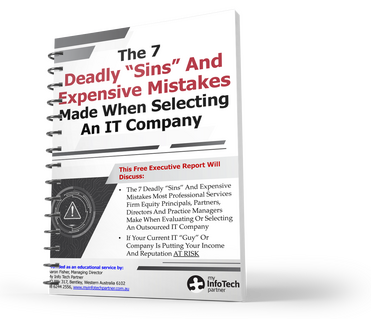 Choosing the right IT company is a daunting task. Pick the wrong one and you could end up locked into a contract where frustrations and costs mount as you get hammered with constant IT problems and horrible service.
Choosing the right IT company is a daunting task. Pick the wrong one and you could end up locked into a contract where frustrations and costs mount as you get hammered with constant IT problems and horrible service.
Pick the right one and you’ll breathe a sigh of relief as your IT problems disappear and you gain complete peace of mind that your reputation, family’s livelihood and firm are protected. Problem is, they all sound good and promise to be proactive, responsive and professional, but how can you really know who the good guys are until you sign a contract and turn over the “keys” to your firm’s network?
You can’t, and that’s why we wrote this executive blog. We want to help equity principals, partners, directors and practice managers avoid the frustration and losses that can result in hiring the wrong IT firm by asking the right questions and knowing what to look for in advance. There are signs, but you have to know what to look for.
Sadly, there’s no shortage of horror stories about incompetent IT “gurus” bungling jobs and causing MORE problems as a result of their gross incompetence, lack of qualified staff and poor cyber security skills. I’m sure if you talk to your friends and colleagues you will get an earful of the unfortunate experiences they have encountered in this area.
Part of the problem is that the IT services industry is not regulated like most other professions, which means ANYONE can claim they are an “IT expert.” This means you, the consumer, must be far more diligent about who you choose to do IT support and arm yourself with the information contained in this blog.
From misleading information and unqualified technicians to poor management and terrible customer service, we’ve seen it all…and we know they exist in abundance because we have had a number of clients come to us to clean up the disasters they have caused.
The following 8 questions in this blog are provided as a sample, to help you when trying to select an IT services company in Perth to work with, raise standards within the IT support industry and to give YOU useful information to help you guard against the lack of ethics or incompetence of some IT companies and technicians.
When I have an IT problem, how do I get support?
Our Answer: When a client has a problem, we “open a ticket” in our IT management system so we can properly assign, track, prioritize, document and resolve client issues. However, some IT firms force you to log in to submit a ticket and won’t allow you to call or e-mail them. This is for THEIR convenience, not yours. Trust me, this will become a giant inconvenience and thorn in your side. While a portal is a good option, it should never be your ONLY option for requesting support.
Do you have a written, guaranteed response time to working on resolving your problems?
Our Answer: Most IT firms offer a 60-minute or 30-minute response time to your call during normal business hours. Be very wary of someone who doesn’t have a guaranteed response time IN WRITING ¬ that’s a sign they are too disorganized, understaffed or overwhelmed to handle your request. Our written, guaranteed response time is 15-minute or less.
Do you have a feedback system in place for your clients to provide ratings on your service?
Our Answer: If they don’t have this type of feedback system or any feedback system, they may be hiding their lousy customer service results. We include options to provide feedback in every ticket and every email communication. Naturally, we also ask in our quarterly review meetings.
Do they offer true managed IT services and support?
Our Answer: You want to find an IT company that will proactively monitor for problems and perform routine maintenance on your IT systems. If they don’t have the ability to do this, or they don’t offer it, we strongly recommend you look somewhere else.
What is NOT included in your managed services agreement?
Our Answer: Another “gotcha” many IT companies fail to explain is what is NOT included in your monthly managed services agreement that will trigger an invoice. Their so-called “all you can eat” option is RARELY true – there are limitations to what’s included and you want to know what they are BEFORE you sign.
But here’s a question you need to ask: If you were hit with a costly ransomware attack, would the recovery be EXTRA or included in your contract? Recovering from a cyber-attack could take HOURS or WEEKS of high-level IT expertise. Who is going to eat that bill? Be sure you’re clear on this before you sign, because surprising you with a big, fat bill is totally and completely unacceptable.
Do you meet with your clients quarterly as part of your managed services agreement?
Our Answer: To us, there’s nothing more important than face-to-face time with our clients. Therefore, we make it a priority to meet with all of our clients at least quarterly (sometimes more often). Our goal in these meetings is to help you improve operations, lower costs, increase efficiencies and ensure your organizational productivity stays high. This is also your opportunity to give us feedback on how we’re doing and discuss upcoming projects.
If I need or want to cancel my service with you, how does this happen and how do you off-board us?
Our Answer: Make sure you carefully review the cancellation clause in your agreement. Many IT firms hold their clients hostage with long-term contracts that contain hefty cancellation penalties and will even sue you if you refuse to pay.
We would never “force” a client to stay with us if they are unhappy for any reason. Therefore, we make it easy to cancel your contract with us, with zero contention or fines. Our “easy out” agreements make us work that much harder to exceed your expectations every day so we keep your business.
What cyber security certifications do you and your in-house team have?
Our Answer: It’s important that your IT firm have some type of recent training and certifications, and should be able to answer this question, which demonstrates a dedication to learning and keeping up with the latest cyber security protections. If they don’t have any, and they aren’t investing in ongoing training for their engineers, that’s a red flag. Some business owners won’t invest in training and give this excuse: “What if I spend all this money in training my employees and then they leave us for another job?” Our response is, “What if you DON’T train them and they stay?”
Do you want to learn more about our expanded answers to these 8 questions, along with another 13, we’ve not included here? Click here and download our free business advisory guide about the 21 critical questions you should ask any IT consultant or company before giving them access to your IT Systems.





 Contact Us On
Contact Us On



